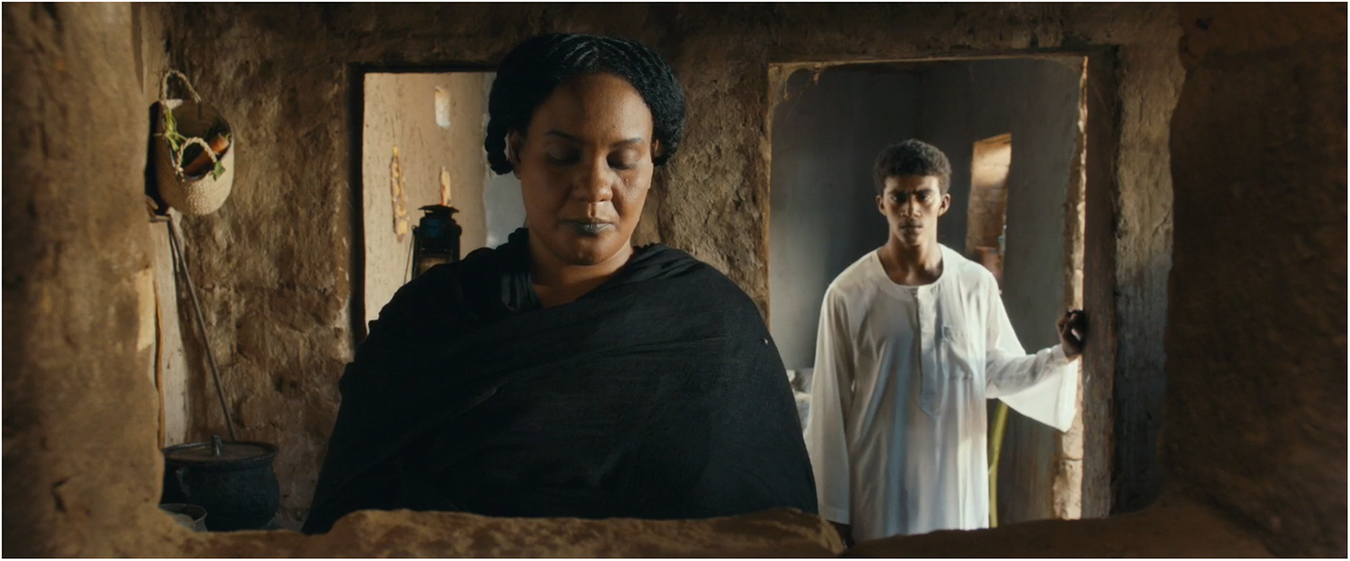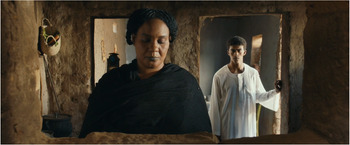Amjad Abu Alala’s visually arresting debut feature film You Will Die at Twenty opens with a kinetic, brightly colored scene at a saint’s tomb, where Sakina (Islam Mubarak) and Alnoor (Talal Afifi) have brought their baby to be blessed. Then, abruptly, all motion stops. A sheik, in a trance-state, drops to the ground at the count of twenty, foretelling that their son Muzamil (Moatasem Rashid as the child and Mustafa Shehata as the youth) will die when he reaches that age. Back at the family’s prison-like compound in a drab village on the banks of the Nile, Alnoor announces that he plans to leave home to seek employment in Addis Ababa. Alone, Sakina marks the passage of time with a stroke on the wall, a grim daily ritual documenting the approach of her son’s predicted demise.
You Will Die at Twenty reflects upon the confining effects of the characters’ fatalistic outlook (Figure 1). The characters find meaning in various forms of Islamic practice. Muzamil seeks solace in the traditional Islamic education offered at the local kutab. He successfully memorizes the Qur’an, mastering two different styles of recitation. The scene when Muzamil celebrates his accomplishment by reciting Qur’an for the community is bathed in light; the interior of the mosque is clean, bright, and fresh, in stark contrast to the mud brick houses and the dirt roads of the village. At a zar ceremony, an exorcism ritual, Sakina enters a trance state, achieving a form of enlightenment depicted in one of several vivid dream sequences that punctuate the film. You Will Die at Twenty, however, levels a more critical eye on the Sufi sheiks of the necropolis. Not only is the devastating prophecy given on their authority, but also, in another scene involving a young sheik, there are hints of sexual abuse.

Figure 1. Doubly framed: Sakina (Islam Mubarak) and Muzamil (Mustafa Shehata) in the confinement of their domestic space. Screenshot, You Will Die at Twenty
Criticism of religious practice and superstition is voiced within the film by the worldly, jaded Sulaiman (Mahmoud Maysara Elsaraj), who has returned to his family’s middle-class home after years of working abroad. Through cinema, Sulaiman introduces Muzamil to a world beyond the confines of the village. Sulaiman’s house contains an archive of old movies and cinema memorabilia, much of it harkening back to the golden age of Egyptian cinema in the 1950s. Muzamil encounters the sensuality of Hind Rostom’s performance in Cairo Station (1958, directed by the celebrated Egyptian filmmaker Youssef Chahine) and the vibrancy of cosmopolitan street life from the documentary Khartoum (1960, by Gadalla Gubara, a pioneer in Sudanese cinema). Abu Alala’s choice of intertexts not only serves as homage to his influences, but also situates his idiom in dialogue with Chahine’s neo-realism and Gubara’s documentary eye.
The diegesis further signals Sulaiman’s urban and pan-Arab inflected nostalgia when he picks up a guitar and strums “Visit Me Every Year,” a classic song of loss and longing by the Egyptian composer Sayed Darwish. But Sulaiman bears the scars of his wanderings. Likewise, Alnoor, upon his return to the village after a nearly two-decade absence, concedes that the insults and humiliations of his life abroad were worse than death. Although the film doesn’t lean hard into the narrative of suffering experienced by millions of economic migrants, it is clear that both Sulaiman and Alnoor are deeply affected by the trauma.
You Will Die at Twenty is based on the Arabic short story “Sleeping at the Foot of the Mountain” (2014) by the Sudanese author Hammur Ziyada. In the film, Abu Alala also obliquely references Tayeb Salih’s Season of Migration to the North (1966). The film, like the celebrated postcolonial Sudanese novel, relates the narrative of two characters who return to a quiet Sudanese village, having been deeply affected by their time abroad, and the climactic scene pivots on a presumed drowning. Abu Alala layers the film’s meditation on the plight of economic migrants onto the novel’s reflection on the violence of the colonial encounter.
The rural village is not so isolated from the outside world after all. Although You Will Die at Twenty is not overtly political, the film’s dedication “to the victims of the Sudanese revolution” shifts the viewer’s perspective on the meaning of the title. Many of the victims of the 2019 revolution to whom the film is dedicated were youths in their twenties. The dedication to the Sudanese people’s struggle to overthrow a repressive regime provides a meta-textual critique of the villagers’ unquestioning fatalism in the film.



